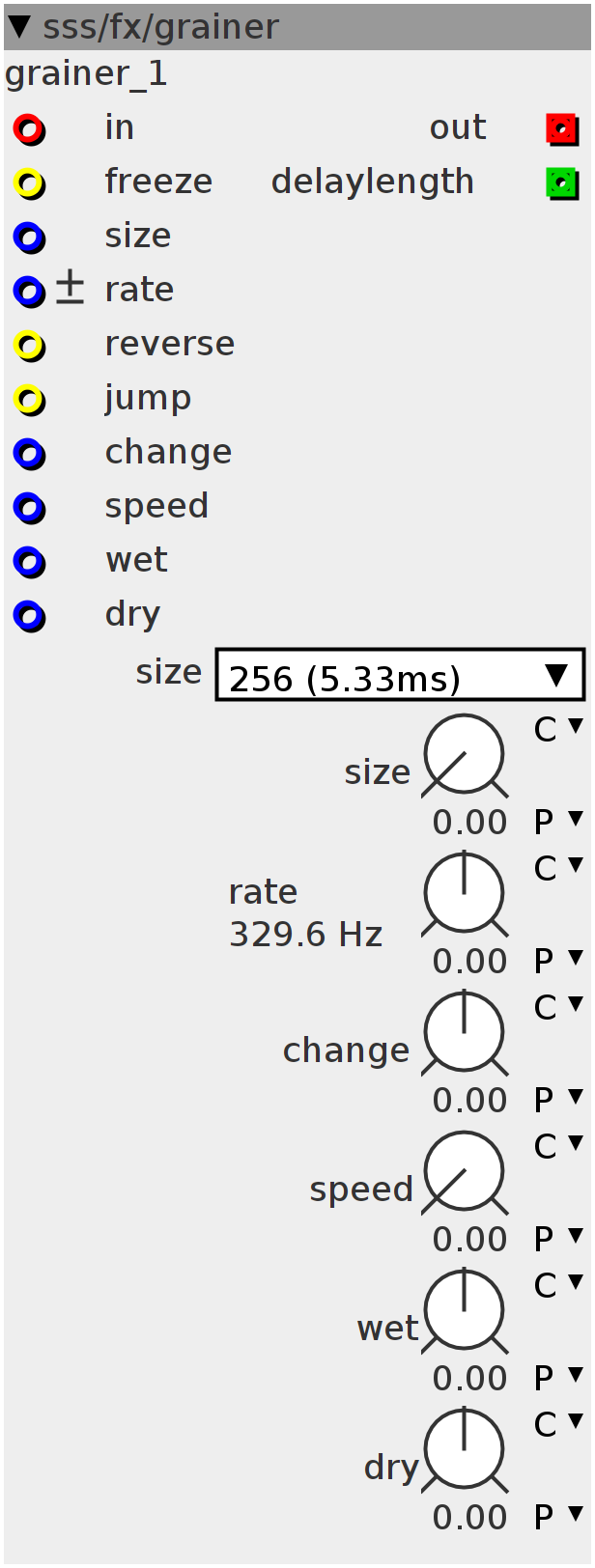grainer
granulizer effect. continuously buffers audio and plays it back both forward and backwards at the same time "freeze" stops the recording to the buffer, causing to repeat the sample over and over. "size" sets the grain size "rate" sets the grain rate "reverse" reverses play direction (gated: high is reverse) when "jump" goes high, the "change" value will be added to the play offset, smoothed out by the "speed" parameter (higher value is faster response) "wet" and "dry" control the mix of original and grained audio. delaylength output is used to connect to my "clock2timing" module. This way the "size" of the delay can be synced to host tempo. Use ratiomaxVCA to set ratio to host tempo.
Inlets
frac32.bipolar rate
frac32buffer wave input
bool32 freeze
bool32 reverse
bool32 jump
frac32 size
frac32 change
frac32 speed
frac32 wet
frac32 dry
Outlets
frac32buffer out
int32 delaylength
Parameters
frac32.u.map size
frac32.u.map speed
frac32.s.map.pitch rate
frac32.s.map change
frac32.s.map wet
frac32.s.map dry
Attributes
combo size
static const uint32_t LENGTHPOW = (attr_size);
static const uint32_t LENGTH = (1 << attr_size);
static const uint32_t LENGTHMASK = ((1 << attr_size) - 1);
int32_t *array;
uint32_t writepos;
uint32_t phase;
int32_t size;
int32_t count;
int32_t can;
int ttrig;static int32_t _array[attr_poly][1 << attr_size]
__attribute__((section(".sdram")));
array = &_array[parent->polyIndex][0];
int i;
writepos = 0;
for (i = 0; i < LENGTH; i++)
array[i] = 0;int32_t freq;
MTOFEXTENDED(param_rate + inlet_rate, freq)
freq = inlet_reverse > 0 ? freq : -freq;
size = param_size + inlet_size;
outlet_delaylength = attr_size;
int32_t speed = __USAT(param_speed + inlet_speed, 27);
speed = ___SMMUL(speed << 3, speed << 2);
speed = ___SMMUL(speed << 3, speed << 2);phase += freq >> 8;
// phase+=(1<<31)/12000;
uint32_t pos = phase >> 5;
// count=pos+(freq>>11)>(1<<27)?count+(param_walk<<5):count;
if ((inlet_jump > 0) && !ttrig) {
count += (param_change + inlet_change) << 3;
ttrig = 1;
} else if (!(inlet_jump > 0)) {
ttrig = 0;
}
can = can + ___SMMUL((count - can) << 3, speed << 2);
pos = pos + can & ((1 << 27) - 1);
if (!(inlet_freeze > 0)) {
writepos = (writepos + 1) & LENGTHMASK;
array[writepos] = __SSAT(inlet_in << 1, 32);
}
uint32_t tmp_d = __USAT(___SMMUL(pos << 3, size << 2), 27);
uint32_t tmp_di = writepos - (tmp_d >> (27 - LENGTHPOW));
uint32_t tmp_w1 = (tmp_d << (LENGTHPOW + 3)) & 0x3FFFFFFF;
uint32_t tmp_w2 = (1 << 30) - tmp_w1;
int32_t tmp_a1 = array[tmp_di & LENGTHMASK];
int32_t tmp_a2 = array[(tmp_di + 1) & LENGTHMASK];
int32_t tmp_ra = ___SMMUL(tmp_a1, tmp_w1);
tmp_ra = ___SMMLA(tmp_a2, tmp_w2, tmp_ra);
tmp_d = __USAT(___SMMUL(((1 << 27) - pos) << 3, size << 2), 27);
tmp_di = writepos - (tmp_d >> (27 - LENGTHPOW));
tmp_w1 = (tmp_d << (LENGTHPOW + 3)) & 0x3FFFFFFF;
tmp_w2 = (1 << 30) - tmp_w1;
tmp_a1 = array[tmp_di & LENGTHMASK];
tmp_a2 = array[(tmp_di + 1) & LENGTHMASK];
int32_t tmp_rb = ___SMMUL(tmp_a1, tmp_w1);
tmp_rb = ___SMMLA(tmp_a2, tmp_w2, tmp_rb);
outlet_out = ___SMMUL((tmp_ra + tmp_rb) << 2, (param_wet + inlet_wet) << 3) +
___SMMUL(inlet_in << 3, (param_dry + inlet_dry) << 2);